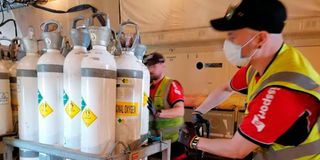India to heighten vaccine production amid Covid-19 crisis
In this file photo a woman reacts as she gets inoculated with a dose of the Covishield, AstraZeneca-Oxford's Covid-19 coronavirus vaccine, at a vaccination centre of the Rajawadi Hospital in Mumbai, India, on April 28, 2021.
What you need to know:
- The announcement could indicate New Delhi’s readiness to continue playing the vaccine production role, even in the wake of a devastating rise in infections.
The Indian government, which is battling a Covid-19 crisis that has seen it suffer shortages of treatment supplies, is pooling resources to produce more vaccines of different types.
The announcement on Saturday came in what could indicate New Delhi’s readiness to continue playing the vaccine production role, even in the wake of a devastating rise in infections.
The Indian government said it was authorising more local firms to take foreign orders and deals to produce Covishield (known abroad as AstraZeneca vaccine), Covaxin (India’s first indigenous Covid-19 vaccine) and Sputnik V, the Russian vaccine; all of which have been authorised for emergency use by the World Health Organisation.
The decision, officials said, was a result of soaring infections and inadequate vaccine production by the two main private manufacturers, the Serum Institute of India (SII) which makes AstraZeneca's vaccine and Bharat Biotech that makes Covaxin.
Dr Randeep Guleria, an Indian pulmonologist and the current director of the All India Institute of Medical Sciences (AIIMS), told the media that Sputnik V manufacturers had tied up with a number of Indian companies in the country to ramp up production of their product.
“New plants [are] being set up by Bharat Biotech and SII by July-August. We will a have large number of doses available in about two months, we will get vaccines from outside too” the director said.
Self-reliance
This comes days after the government of Prime Minister Narendra Modi contracted three State-owned vaccine makers to boost production of Covaxin anda allowed more manufacturing plants to partner with their international counterparts in effort to meet the high demands.
The pharmaceutical companies include Hyderabad-based Indian Immunologicals Ltd (ILL), Bharat Immunologicals and Biologicals Ltd (BIBCOL) in Bulandshehr, Uttar Pradesh and Mumbai-based Haffkine Institute, which is one of the country's oldest biomedical research institutes that bailed India out during the 1896 bubonic plague in Bombay.

In this photograph taken on May 12, 2021, a volunteer pushes a stretcher past funeral pyres of Covid-19 coronavirus victims at a crematorium in New Delhi, India.
The initiative is being driven under a local drive for ‘self-reliance’, known locally as the Atmanirbhar Bharat 3.0 Covid Suraksha under the ruling Bharatiya Janata Party (BJP), whose aim is to support local firms accelerate development and production of Indigenous Covid-19 vaccines.
India produces the world’s largest share of any vaccines, handling at least 60 per cent of all jabs consumed globally. It has been the centre of production for the Covax vaccine facility spearheaded by the World Health Organization, targeting poor countries like those in Africa.
But it has had a battle for the past one month after new variants of Covid-19 emerged, forcing export of vaccines to be restricted.
It reported the fewest cases on Saturday, but the numbers were still hovering high, with the country having reported an average of 320,000 case a day in early May.
Some 24.4 million people have contracted the virus while 20.4 million of them have recovered. But the world’s second populous nation has reported over 266,000 deaths, including a horrid average of 3,000 a day in April.
As per government data, vaccination rates crushed by half in late April this year as supplies of vaccines dried up.
Collaboration
Modi, however, said, it was expanding vaccination to all adults from May 1 and now the biggest of India’s 28 states and eight union territories insist that they will use their limited stocks on the second dose for people older than 45.
Officials say they want to meet the challenge by upgrading production lines for Bharat Biotech Limited, Hyderabad as well as other public sector manufacturers with required infrastructure and technology.
As part of the plan, the India will provide financial support to Bharat Biotech worth Sh950, 441, 822, enabling it to produce 20 million doses per month once it starts running.
IIL will get Sh877, 330, 913 while BIBCOL will receive Sh438, 665,456 to prepare their facilities to manufacture 10-15 million doses per month, each.
In addition, in the state of Gujarat, Gujarat Biotechnology Research Centre, Hester Biosciences and OmniBRx have teamed up for technology transfer with Bharat Biotech to produce a minimum 20 million doses per month.

Crew members load medical oxygen and ventilators onto a cargo plane bound for Delhi, India at Helsinki airport in Finland on May 11, 2021 to be loaded with oxygen tanks and ventilators under an EU aid scheme.
On Saturday, Modi chaired a high-level meeting on the matter. Senior officials attending the meeting furnished the premier with a detailed briefing on the status of other Covid-19 related efforts, from testing to the positivity and recovery rates.
Modi ordered the rate of Covid-19 testing be scaled up in areas that have reported high positivity rates, according to an official press note on Saturday.
“For states where the [rate] in districts is high, both RT-PCR and rapid tests need to be scaled up further. They should report their numbers transparently without any pressure of high numbers showing adversely on their efforts,” the Prime Minister said, referring to the two technologies used to diagnose Covid-19.
India recorded 326,098 new coronavirus cases and 3,890 deaths on Saturday as per data from the country’s Health ministry.
According to the Indian Council of Medical Research (ICMR), 313,017,193 samples had been tested by May 14 and while 1,693,093 samples were tested on Friday.





